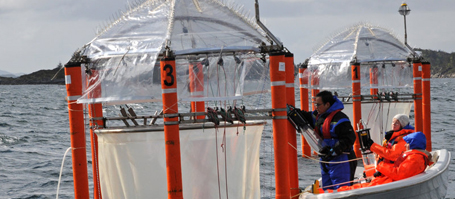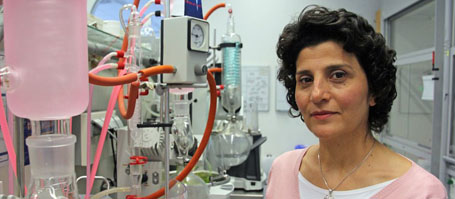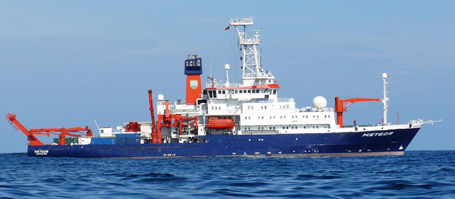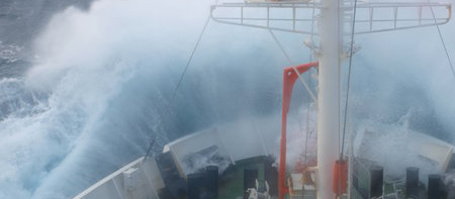Professor Hans-Otto Pörtner, biologist at the Alfred Wegener Institute, Helmholtz Centre for Polar and Marine Research and the newly elected co-chairman of the working group II of the sixth status report of the World Climate Council IPCC, outlined the risks that are expected for the oceans due to climate change: warming, sea level rise and, in particular, ocean acidification. In addition to the tropical coral reefs, the sea ice regions of the Arctic are said to be the most vulnerable ecosystems. In the current world climate report, critical changing thresholds for organisms and ecosystems and the associated risks have been analyzed for the first time and were calculated in relation to temperatures. “We can clearly say that the warming due to anthropogenic causes must be limited to significantly below 2°C – more like 1.5°C”, explains Hans-Otto Pörtner. The vulnerability of the coral reefs requires an even stronger limitation, as Pörtner made clear: “According to model calculations we can sustain fifty percent of the coral reefs, if we limit the temperature rise to about 1.2°C. However, additional risks, for example, through ocean acidification have not yet been included in the calculation.”
Ocean acidification: How a greenhouse gas change the oceans
Acidification is one of the major climate risks for the oceans: the ocean takes in 24 million tons of carbon dioxide (CO2) every day. It has absorbed a third of the CO2 released since the beginning of industrialization up to now and, in this way, has reduced the impact of climate change. As a consequence of CO2 absorption the acidity of the ocean is about 28 percent higher than in pre-industrial times. If CO2 emissions are not cut, the acidity will more than double by the end of this century. The more acidic the oceans become the less additional carbon dioxide they can take up from the atmosphere. “The speed of the predicted ocean acidification is unprecedented in the history of the earth”, emphasized Professor Ulf Riebebesell, director of the research unit biological oceanography at the GEOMAR Helmholtz Centre for Ocean Research Kiel. In particular, calcifying organisms are among the losers of ocean acidification, apart from corals, this includes also mussels, snails, sea urchins and starfish as well as many calcifying organisms among plankton.”
GEOMAR field experiment in Norway: Winners and losers of acidification
During the climate breakfast, Ulf Riebesell presented first results of the field experiment which was conducted in the Norwegian Raunefjord, south of Bergen in spring 2015. In the course of the experiment, the impact of acidification in so-called mesocosms (partly closed experimental sites in the fjord used for the simulation of biological, chemical and physical processes) was studied for several months. In the Norwegian Raunefjord, in particular, winged snails and coralline algae are among the losers. However, the Pikoplankton – very small organisms at the basis of the food web - was among the winners. According to Ulf Riebesell who coordinates the joint project BIOACID (Biological Impacts of Ocean Acidification) at GEOMAR which is funded by the federal ministry of education and research (BMBF): “Small changes in the ecosystem can have huge consequences which not only turn the ocean food web upside down but also influence aquaculture and fisheries”.
Climate change and ocean acidification
Ocean acidification is a direct consequence of the carbon dioxide emissions from humans. The interaction of climate factors on marine organisms along with other anthropogenic changes, such as over-fertilization and pollution, lead to complex changes in ecosystems, to the emigration of species and to an overall decrease in biodiversity. As a consequence, the oceans are exposed to diverse stresses, the consequences of which scientists are only beginning to understand.
A young science faces big challenges
The research on ocean acidification faces particular challenges as a young science. It would be necessary to unite different levels of change – environmental factors, interaction between organisms of the food web and adaption on longer time scales – emphasized Ulf Riebesell. “Since time is pressing, special focus should be put on those aspects which are relevant to society. These are in particular fisheries, aquaculture, tourism and coastal protection. We have to direct our attention to these topics in order to develop the necessary options for action for political decisions and management strategies.”
Contact:
Maike Nicolai (Communication & Media), Phone 0431-600-2807
mnicolai@geomar.de
…



